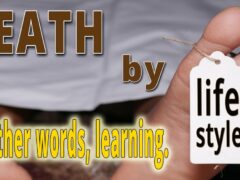INTERHEART Study: Over 90% of heart attacks (myocardial infractions) can be attributed to lifestyle. America Cancer Society: There is an 82% correlation between lifestyles and cancers. Lifestyle (n.): First used in 1921 by psychologist Alfred Adler for “a person’s basic character as established early in childhood”. Since 1961 the word has broadly meant, “a way or style of living” […]

